Newberry Opera House Foundation will present “Cross that River” on Tuesday, October 26 at 11:00 a.m. and 7:00 p.m. The musical tells the story of American’s West from the perspective of the African American cowboys who journeyed from slavery to freedom out West. This programming was supported with funding from a Growth Grant from South Carolina Humanities. Funding for the Growth Grants has been provided by the National Endowment for the Humanities (NEH) as part of the American Rescue Plan Act of 2021.
Jazz composer, musician, and singer Alan Harris is at the center of the show as Blue, a former slave that escapes to Texas and becomes a cowboy. He wants nothing more than to be free, to live, and to love as he chooses. “If I was going to live, I had to cross that river,” Harris tells. Interweaving fiction with historical facts, Harris and the band speak in first person, sing the story’s themes, and showcase iconic images that help to tell the story. While the story is brutally honest about slavery and the treatment of Native Americans, the piece at its heart is optimistic.
The show at 11:00 a.m. on Tuesday, October 26 is a 1-hour abbreviated educational performance. Some of the frank history might not be appropriate for children under 10 without an adult companion & conversation. After both performances, Newberry Opera House will offer a panel discussion with Allan Harris and Dr. J. Tracy Power of Newberry College to discuss the history behind the performance and black cowboys in the West.
Thanks to the support of Newberry Arts For All these performances are now free. Seating will begin approximately 45 minutes prior to showtime. Learn more: https://www.newberryoperahouse.com/shows-and-events.html?show_name=cross-that-river.
The mission of SC Humanities is to enrich the cultural and intellectual lives of all South Carolinians. Established in 1973, this 501(c) 3 organization is governed by a volunteer 21-member Board of Directors comprised of community leaders from throughout the state. It presents and/or supports literary initiatives, lectures, exhibits, festivals, publications, oral history projects, videos and other humanities-based experiences that directly or indirectly reach more than 250,000 citizens annually.
